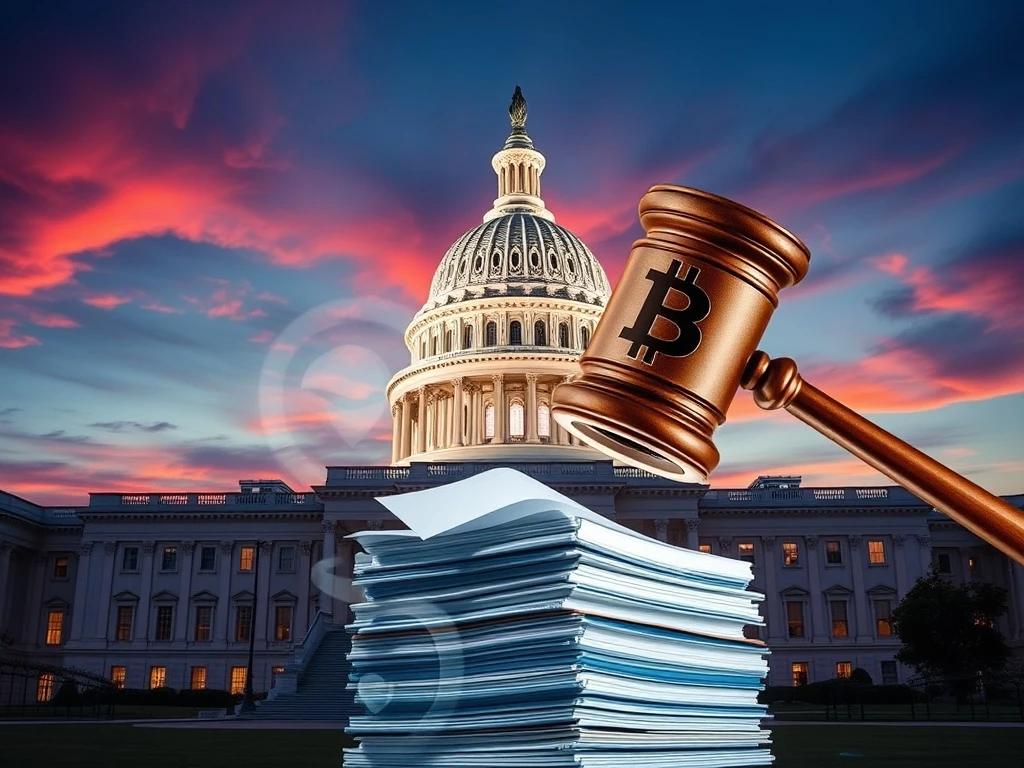Crucial US Crypto Bills Advance: A Breakthrough for Digital Assets?

Are you keeping up with the whirlwind of developments in the crypto world? Today, the digital asset landscape saw significant movement, particularly from the halls of US Congress and the offices of the Securities and Exchange Commission (SEC). From groundbreaking legislative progress to crucial regulatory delays, understanding these shifts is vital for anyone navigating the dynamic crypto market. Let’s dive into the day’s top stories and what they mean for Bitcoin, stablecoins, and the future of decentralized finance.
Understanding the Latest **US Crypto Bills**
In a landmark session, the US House of Representatives pushed forward three pivotal pieces of legislation aimed at shaping the future of digital assets. This legislative marathon, including the longest vote in House history, signals a determined effort by lawmakers to establish clear guidelines for the crypto industry. After extensive debate and some Republican holdouts over central bank digital currencies (CBDCs), these bills finally moved ahead, marking a significant stride in the quest for regulatory clarity.
Here’s a breakdown of the three key bills passed:
- Digital Asset Market Clarity (CLARITY) Act: This bill passed with a vote of 294-134, with strong bipartisan support, including nearly 80 Democrats. Its primary goal is to establish a robust market structure for cryptocurrencies, aiming to provide much-needed legal and regulatory clarity for digital assets. The CLARITY Act seeks to define which digital assets are securities and which are commodities, a distinction that has long been a point of contention and uncertainty in the industry. By creating a clearer framework, it intends to foster innovation while protecting investors.
- Guiding and Establishing National Innovation for US Stablecoins (GENIUS) Act: Passed with a vote of 308-122, this act focuses on stablecoins, which are digital currencies pegged to a stable asset like the US dollar. With over 100 Democrats supporting it, the GENIUS Act aims to create a comprehensive regulatory framework for stablecoins, addressing issues like issuance, redemption, and reserve requirements. The goal is to ensure financial stability and consumer protection while encouraging innovation in this rapidly growing sector of the crypto market. This bill is crucial for integrating stablecoins into the broader financial system.
- Anti-CBDC Surveillance State Act: This bill, passing by a narrower margin of 219-210, reflects growing concerns among some lawmakers about the potential for government surveillance and control through a US central bank digital currency. It seeks to prevent the Federal Reserve from issuing a CBDC that could infringe on privacy or grant excessive power to the government. The debate around this act was particularly intense, leading to a nine-hour procedural vote stalemate as some Republicans demanded a guaranteed ban on CBDCs before supporting the broader legislative package. Ultimately, a deal was struck to add a CBDC ban to a must-pass defense spending bill, the National Defense Authorization Act (NDAA), clearing the way for these crucial crypto bills to advance.
These legislative actions come as part of the Republican ‘crypto week’ initiative, aligning with former President Donald Trump’s stated intention to quickly implement his crypto agenda. The bipartisan support for the CLARITY and GENIUS Acts, in particular, highlights a growing consensus that clear **crypto regulation** is essential for the industry’s maturation and integration into the mainstream economy.
The SEC’s Stance: Navigating **SEC Crypto** Delays
While Congress made strides, the US Securities and Exchange Commission (SEC) continues to deliberate on key decisions impacting the crypto market. The agency recently extended its deadline to decide on whether to allow in-kind redemptions for Bitwise’s spot Bitcoin and Ether ETFs on NYSE Arca. This extension, though within the maximum 90-day review limit, underscores the SEC’s cautious approach to digital asset products.
The concept of ‘in-kind redemptions’ is a significant point of discussion for these exchange-traded funds (ETFs). If approved, it would allow investors to receive the underlying assets (Bitcoin or Ether) directly when redeeming their ETF shares, rather than receiving cash. This mechanism could offer several potential benefits, including:
- Tax Efficiency: In-kind redemptions can be more tax-efficient for fund managers and investors, potentially reducing capital gains taxes.
- Operational Flexibility: It provides greater flexibility for managing the fund’s assets and optimizing its structure.
- Market Impact: It could lead to more efficient price discovery and reduce potential market distortions compared to cash-only redemptions.
The SEC stated that more time is needed to fully consider the implications of this proposed rule change. This delay is not an isolated incident. The agency has faced criticism for its slow pace in approving various crypto-related products. Grayscale, for instance, recently challenged the SEC’s handling of its Digital Large Cap ETF, accusing the agency of violating statutory deadlines. These ongoing delays create uncertainty for institutional investors and product issuers.
However, there are signs of a potential shift within the SEC. Under Chair Paul Atkins, appointed during the Trump administration, the agency has pledged a more transparent and innovation-friendly approach. While this change in leadership offers a glimmer of hope for faster approvals and clearer guidelines, the continued delays on specific applications like Bitwise’s highlight the complex challenges the SEC faces in regulating a novel asset class.
What **Bitcoin ETF** Decisions Mean for Investors
The approval of a spot **Bitcoin ETF** has long been considered a watershed moment for mainstream crypto adoption. While several spot Bitcoin ETFs have launched, the specifics of their operational mechanisms, such as in-kind redemptions, remain critical. The SEC’s decision on Bitwise’s in-kind redemption proposal is closely watched because it could set a precedent for other digital asset ETFs and significantly impact how institutional money flows into the crypto space.
For investors, the availability of well-regulated Bitcoin and Ether ETFs with efficient redemption mechanisms means easier access to these digital assets without directly holding them. This simplifies investment, potentially attracting a broader range of traditional investors who are accustomed to trading securities. The ability to redeem in-kind could also enhance the appeal of these ETFs by improving their overall efficiency and reducing associated costs over time.
The ongoing regulatory dance around Bitcoin ETFs reflects the broader tension between traditional financial regulations and the innovative nature of cryptocurrencies. As more institutional players seek to offer crypto-related products, the SEC’s evolving stance will dictate the pace and shape of this integration. A clear and consistent approach from the SEC could unlock significant capital for the crypto market, further solidifying Bitcoin’s position as a legitimate asset class.
The Path Forward for **Stablecoin Regulation**
The passage of the GENIUS Act by the US House is a monumental step towards comprehensive **stablecoin regulation**. Stablecoins have become a cornerstone of the crypto economy, facilitating billions of dollars in daily transactions, particularly in decentralized finance (DeFi). However, their rapid growth has also raised concerns among regulators regarding financial stability, consumer protection, and illicit finance risks.
Why is dedicated stablecoin regulation so important?
- Financial Stability: Large, widely adopted stablecoins could pose systemic risks if not properly managed and backed. Clear regulations ensure that stablecoin issuers maintain adequate reserves and operate transparently.
- Consumer Protection: Regulations can protect users from fraud, mismanagement, and unexpected de-pegging events, building trust in the stablecoin ecosystem.
- Global Competitiveness: By establishing a robust regulatory framework, the US aims to maintain its leadership in financial innovation and prevent other jurisdictions from gaining an edge in the digital asset space.
- Integration with Traditional Finance: A regulated stablecoin market can more seamlessly integrate with traditional banking systems, facilitating faster and cheaper cross-border payments and other financial services.
The GENIUS Act’s focus on innovation while establishing national guidelines is a delicate balance. It seeks to prevent a patchwork of state-level regulations, providing a uniform approach that can foster growth and ensure compliance across the board. This move could significantly bolster the legitimacy and utility of stablecoins, making them an even more integral part of the global financial infrastructure.
Decoding the Impact of **Crypto Regulation**
The flurry of legislative and regulatory activity today underscores a critical juncture for the crypto industry. The advancements in US crypto bills, coupled with the ongoing SEC decisions, are setting the stage for a more defined and potentially more mature digital asset market. This push for **crypto regulation** is not just about compliance; it’s about legitimizing the space, attracting more institutional capital, and protecting retail investors.
While the passage of these bills in the House is a major victory for proponents of clear regulation, the legislative journey is far from over. The bills still need to pass the Senate and be signed into law. This process can be lengthy and subject to further amendments and political maneuvering. However, the bipartisan support seen in the House provides a strong indication of the growing recognition among lawmakers that cryptocurrencies require a tailored regulatory approach rather than being forced into existing frameworks designed for traditional assets.
The political drama surrounding the CBDC ban, leading to the longest House vote in history, also highlights the deep-seated ideological divisions and concerns within government regarding the future of money and privacy. This debate is likely to continue as digital currencies become more prevalent.
Key Takeaways and What’s Next:
- Legislative Momentum: The House’s action demonstrates a clear intent to legislate crypto, moving beyond just discussions.
- SEC Scrutiny: The SEC remains a critical gatekeeper, with its decisions on ETFs and other products having significant market implications.
- Focus on Stablecoins: The GENIUS Act highlights the increasing importance and regulatory focus on stablecoins as a bridge between traditional and decentralized finance.
- Bipartisan Efforts: Despite political divides, there’s growing bipartisan consensus on the need for clearer crypto frameworks.
- Continued Evolution: The regulatory landscape is still evolving, and market participants should remain vigilant for further developments.
Today’s events are a testament to the ongoing maturation of the cryptocurrency industry. As lawmakers and regulators grapple with the complexities of digital assets, the push for clarity and robust frameworks will continue to shape the trajectory of Bitcoin, stablecoins, and the broader crypto ecosystem. The path ahead promises more debates, more decisions, and ultimately, a more defined future for digital finance. Stay informed, as these crucial developments will undoubtedly influence your crypto journey.










